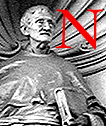[The following passage comes from the author’s The Antagonist Principle: John Henry Newman and the Paradox of Personality, which is reviewed elsewhere on this site. — George P. Landow]

ewman's vexed relationship with Henry Manning was not the least of the products of his Catholic years. Over the last century, Manning, on the whole (and with the exceptions of such balanced scholars as David Newsome and James Pereiro) has had a bad press. He was doubtless much that he has been accused of being—ambitious, devious, and politically motivated—and he has earned a reputation for equivocation, particularly in interpreting Newman's actions to the hierarchy. Certainly temperament had much to do with their differences. Manning was a well-informed man and no mean theologian. But he was a man of the world, not a cloistered university don, and his practical experience as an archdeacon in the Church of England had shown his capacity to manage men. He was an accomplished bureaucrat who moved naturally in the complexities of Vatican politics; Newman was not. Both men craved power, but Manning through authority, Newman through influence. Yet Manning was no stranger to the joys and sorrows of the human condition. The loss of his wife in the years before his own reception into the Roman Catholic Church was a source of continuing sorrow throughout his life, though he did not make a public display of his bereavements, and his intervention in the London Dock Strike (1889) demonstrated a political pragmatism quite beyond Newman's ken.
To Newman's principle of personality Manning posed the antagonist principle of bureaucracy as a way of containing gifted but excitable individuals who might disrupt ecclesiastical due process. Manning had small sympathy for theories of development, and even less interest in the role of the laity, whom he famously dismissed as fit for hunting and fishing but not for theological disputation. He was decisive where Newman was hesitant, but a virtue of his limitations as well as a consequence of his power was that he found it easier to eschew grudges. As John Page has noted, Newman's intellectual response to the papal claims was indirect, veering and tacking, in short (to take a term from Ian Ker) unscholastic, because his personality was "careful, tolerant, and given to second thoughts" (Page 421), while his historical method elevated inference over logic. His argument in counseling troubled Catholics was that confession did not demand adherence to a specific definition de fide as long as they had made an active avowal of faith in the Church's teaching. This would have struck Manning as worse than hairsplitting; it was a failure of loyalty and indeed of nerve.
More deeply, the two men held different beliefs on how one comes to religious faith. Newman's Grammar of Assent . . . was the product of a patient mind disentangling, over many years, the intricate processes by which individuals come to belief: how the reason cooperates, through the accumulation of probabilities, in the task of finding certitude. Manning’s idea of certainty (not the same as Newman's "certitude") amounted to a rejection of the Butlerian theory of probability that Newman had embraced years before, and Manning's interpretation of the Catholic position was that right reason "leads us to the fact of a Divine Teacher; but thenceforward His voice, and not our balancing of probabilities, will be the formal motive of the faith." The Church's witness was not only "human and historical" but "supernatural and divine." Thus, "My faith terminates no longer in a cumulus of probabilities, gathered from the past, but upon the veracity of a Divine Power guiding me with His presence" (Manning 75-76). This standard, enunciated three years before the appearance of the Grammar of Assent, was surely behind Manning’s belief that Newman had never really left off being an Anglican at heart. [218-19]
Bibliography
Poston, Lawrence. The Antagonist Principle: John Henry Newman and the Paradox of Personality. Charlottesville and London: University of Virginia Press, 2014.
Last modified 24 November 2014